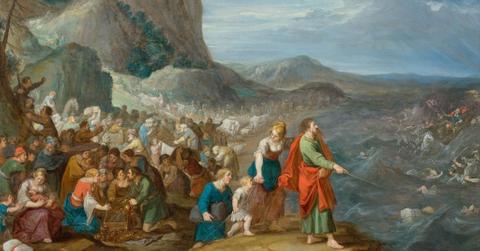Moses or Meteorological Mayhem? Study Reveals Forces That May Have Parted Red Sea, Including One Mentioned in Bible

A 17th-century painting of Moses at the Red Sea by Hans Jourdaens III.
Jan. 4 2024, Published 1:01 p.m. ET
the Bible recounts the divine parting of the Red Sea by God, but recent findings by scientists propose an alternative explanation.
Two students from the University of Leicester, Rebekah Garrett and Rikesh Kunverji, recently released their study that suggests that unique weather conditions, rather than a miraculous event, may have facilitated the escape of the Israelites from the pursuing Egyptian army around 3,000 years ago.
Garrett and Kunverji do not entirely discount the Biblical account, acknowledging that the probability of a 'parting' is not zero. Instead, they present four plausible meteorological phenomena that could have led to the splitting of the Red Sea in a single night.
The first proposed factor is "wind setdown," wherein a persistent, strong wind lowers water levels in one area while causing water to accumulate downwind.
The researchers cite historical instances, such as an event in the 1800s in the Nile River Delta, where a powerful wind resulted in a five-foot water displacement, revealing dry ground underneath.
Exodus 14:21 in the King James Version of the Bible mentions a "strong east wind all that night" coinciding with the Israelite crossing.
The second weather factor suggested is a tidal surge, potentially causing a drop in the water level of the Red Sea, according to The Telegraph.
This idea has been previously explored, with references to Moses possibly understanding lunar patterns for predicting high and low tides. However, current tide charts for the region indicate minimal tidal fluctuations.
- Puzzling Discovery: Marine Archaeologists Investigate Mysterious Object Exposed in Lake Erie During Extreme Weather
- Buried Treasure: Archaeologists in Egypt Find 'Miracle' Tunnel in Search for Cleopatra and Marc Antony's Tomb
- What Lies Beneath: NASA Scientist Believes Aliens May Have Found 'Perfect' Hiding Spot in Earth's Oceans
The third factor involves "negative surges," where extreme weather conditions lead to a temporary decrease in coastal water levels.
An analogy is drawn to Hurricane Ian in 2022, causing part of Tampa Bay to drain and then refill due to counterclockwise winds, NBC News reported. However, the biblical account specifies an eastward wind, not consistent with the hurricane's influence.
Never miss a story — sign up for the Front Page Detectives newsletter. Be on the scene the moment news breaks.
The fourth possible explanation is "Rossby waves," discovered in 1939, which can cause higher-than-normal tides in seas.
Garrett and Kunverji suggest that such waves in the Red Sea might have moved significant amounts of water, resulting in an unusually low tide, allowing the Israelites to walk through.
The study, published in The Journal of Interdisciplinary Science Topics, adds to the ongoing debate about the events surrounding the Passover season, or the "Days of Unleavened Bread."
Become a Front Page Detective
Sign up to receive breaking
Front Page Detectives
news and exclusive investigations.
